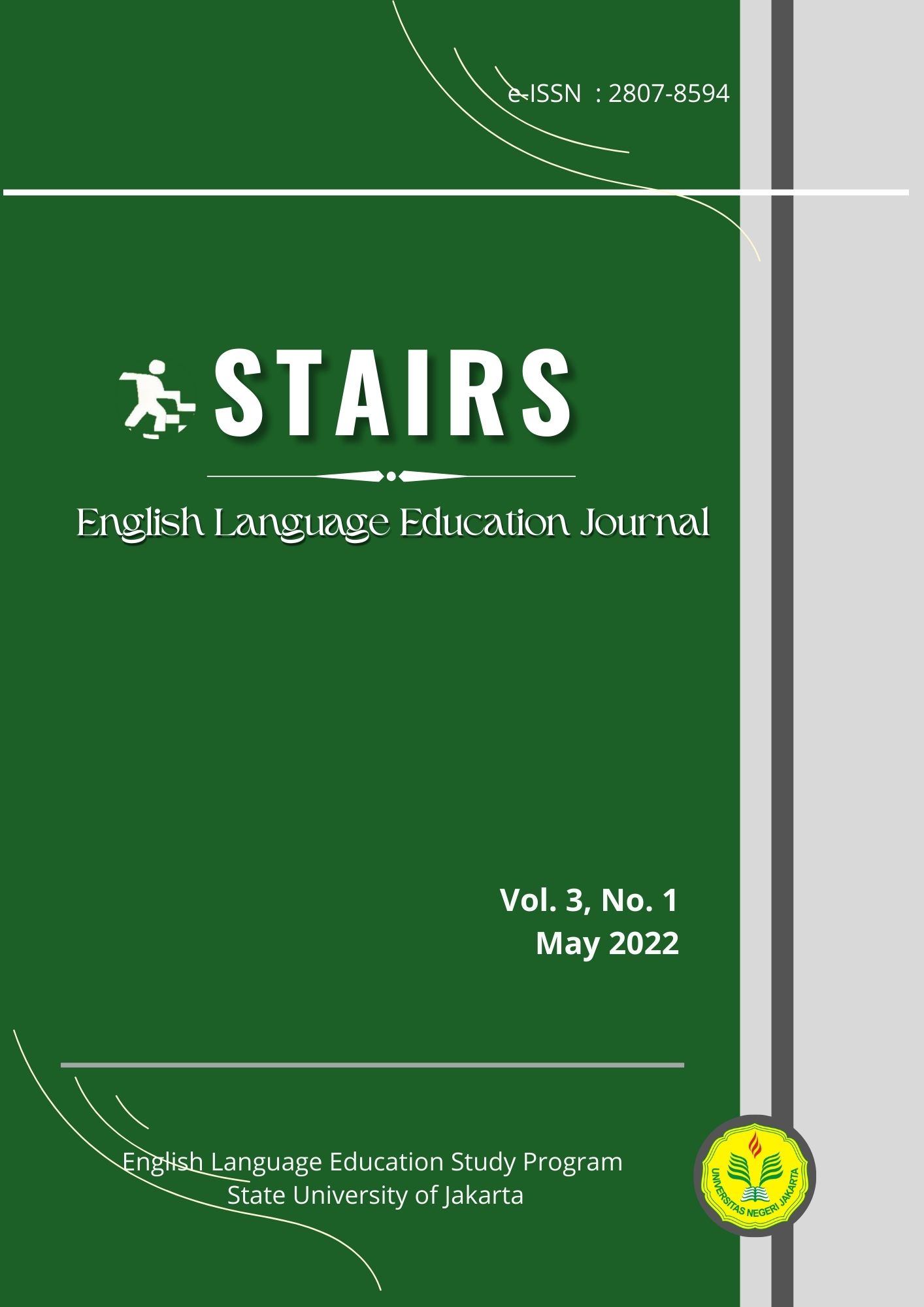The Alignment of Interpersonal Text Language Functions in Podcasts with the Standard Competence of English Language for Junior High School
DOI:
https://doi.org/10.21009/stairs.3.1.6Keywords:
Podcast, Interpersonal Conversation Text, Teaching Materials, EFL, Content AnalysisAbstract
This study aims to analyze the alignment of the interpersonal text language functions that occurred in podcasts with the standard competence of the 2013 curriculum to teach interpersonal texts for Junior High School. This research is a descriptive qualitative study using the content analysis method. The study is based on KI (Kompetensi Inti)/KD (Kompetensi Dasar) in Kurikulum 2013 proposed by the Indonesian Ministry of Education and Culture (2018) as the analysis framework to analyze the type of language function and expressions of interpersonal text used in the 15 podcasts. The result shows that all 15 podcasts provide 18 out of 21 language functions required in the standard competence of Interpersonal texts at the Junior High level. The language functions occurring in all podcasts cover Greeting, Leavetaking, Extending Invitations, Expressing Gratitude, Complimenting, Asking for Attention, Asking for Opinions, Expressing Opinions, and so on. It means the podcasts fulfilled 85,7% of the standard competence and can be used as teaching materials to teach interpersonal text for Junior High School students.
References
Alfa, R. R. (2020). Using Podcasts as Authentic Materials to Develop Students’ Speaking Skills. JELLT Vol.4, No.1.
Al-Nwaiem, A. (2012). An Evaluation of the Language Improvement Component in the Pre-Service ELT Programme at a College of Education in Kuwait: A case study. Unpublished Dissertation. The University of Exeter.
Anggraeni, D. (2020). An Analysis on English Textbook Entitled “Let’s Learn English” for The Tenth Grader of Senior High School Based on The Basic Competence of the 2013 Curriculum. RETAIN, 122-132.
Artyushina, G., Sheypak, O., & Golov, R. (2017). Podcasting as a Good Way to Learn Second Language in e-Learning. IC4E '17. Kuala Lumpur, Malaysia.
Auliya, S. P. (2019). Interpersonal Communication in Digital-based Public Spaces: Self-Disclosure. METAKOM, 15-27.
Azalia. (2020). Interpersonal Markers Used by the Speakers on the Sister Diary Podcast. Thesis.
Casares, D. R. (2020). Embracing the Podcast Era: Trends, Opportunities, &Implications for Counselors. Journal of Creativity in Mental Health, 1-16.
Celce-Murcia, M., Dornyei, Z., & Thurrell, S. (1995). Communicative Competence: A Pedagogical Motivated Model with Content Specifications. Issues in Applied Linguistics, 6 (2), 5 – 35.
Creswell, J. W. (2014). Research Design, Qualitative, Quantitative, and Mixed Methods Approaches (Fourth Edition). United State of America: Sage Publications.
Díez, M. T., & Richters, M. A. (2020). Podcasting as a Tool to Develop Speaking Skills in the Foreign Language Classroom. The EUROCALL Review, Volume28, No. 1.
Dwiwulandari, R., & Dewanti, R. (2020). The Analysis of Conversational Implicature in an Extensive Listening of BBC Learning English Podcast. STAIRS: English Language Education Journal, 1(2).
Gumilang, W. A. (2020). The Use of Radio Podcast in Teaching Listening Comprehension at STKIP PGRI Tulungagung. BRIGHT: A Journal of English Language Teaching, Linguistics, and Literature, pp. 34-45.
Halim, A., Mukminatien, N., Anugerahwati, M. (2018). The Students’ Perceptions Towards Authentic Materials for Reading and Listening Activities. Getsempena English Education Journal (GEEJ), 150–161.
Hasan, M., Hoon, T. B. (2013). Podcast Applications in Language Learning: A Review of Recent Studies. English Language Teaching, 128-135.
Iskandar, M. A. G. (2008). Transactional and Interpersonal Conversations Introduced in Grade VII English Textbook. Thesis.
Kemendikbud. (2016). Permendikbud Nomor 22 Tahun 2016 Tentang Standar Proses Pendidikan dan Menengah. Jakarta: Kemendikbud.
Mashhadi, A., Hayati, A., & Jalilifar, A. (2016). The Impact of Podcasts on English Vocabulary Development in a Blended Educational Model. Applied Research on the English Language, 145- 172.
Mayring, P. (2004). Qualitative Content Analysis. A Companion to Qualitative Research, 1: (159-176).
McMillan, J. (2010). Understanding and Evaluating Educational Research. Upper Saddle River, New Jersey: Pearson Education, Inc.
Menda, Y. (2018). ELLs: English Listening Comprehension Development through Digital Literacy Practices. International Journal of Research in Social Sciences, Vol. 8 Issue 8.
NamazianDost, I., Bohloulzadeh, G., & Rahmatollahi, R. (2017). The Effects of Using Podcast on Listening Comprehension among Iranian Pre-intermediate EFL Learners. International Journal of Applied Linguistics &English Literature.
Nelson, D., & Faux II, W. (2016). Evaluating Podcast Compositions: Assessing Credibility, Challenges, and Innovation. The Journal of Social Media in Society.
Nuha, U. (2019). Compatibility of Transactional and Interpersonal Conversation Texts in MTs English Textbook with The Standard of Content. Jurnal Penelitian.
Nuha, U. (2014). Transactional and Interpersonal Conversation Texts in English Textbook. REGISTER, Vol. 7, No. 2.
Pratiwi, A., Mobit, & Ahmad, Y. B. (2020). Podcast-mediated Classroom Listening Practice in an Indonesian EFL Setting. English Ideas: Journal of English Language Education.
Purnaningtyas, W. (2016). The Quality of English Textbook Entitled ‘When English Rings a Bell’ in Supporting Communicative Competence of Junior High School Students. Skripsi.
Rahman, A., Atmowardoyo, H., & Salija, K. (2018). Podcast Effects on EFL Learners’ Listening Comprehension. ELT Worldwide, Volume 5 Number 2.
Ramli. (2017). The Use of Podcast to Improve Students' Listening and Speaking Skills for EFL Learners. Advances in Social Science, Education and Humanities Research.
Rosell-Aguilar, F. (2007). Top of the Pods – In Search of a Podcasting “Podagogy” for Language Learning. Computer Assisted Language Learning, 471–492.
Samad, I. A., Bustari, A., & Ahmad, D. (2017). The Use of Podcasts in Improving Students’ Speaking Skill. Journal of English Language and Education.
Samad, I. A., Jannah, M., & Fitriani, S. S. (2017). EFL Students' Strategies Dealing with Common Difficulties in TOEFL Reading Comprehension Section. International Journal of Language Education, 29-36.
Sayadi, M., & Heidar, D. (2018). The Impact of Using Podcasts on Iranian Autonomous/Non- Autonomous EFL Learners' Listening Comprehension Intermediate Level. International Journal of Research in English Education (IJREE).
Tsagkias, M., Larson, M., Weerkamp, W., & Rijke, M. (2008). PodCred: A Framework for Analyzing Podcast Preference. WICOW’08.
Yoestara, M., & Putri, Z. (2018). Podcast: An Alternative Way to Improve EFL Students’ Listening and Speaking Performance. Englisia Vol. 6, No. 1, 15-26.



